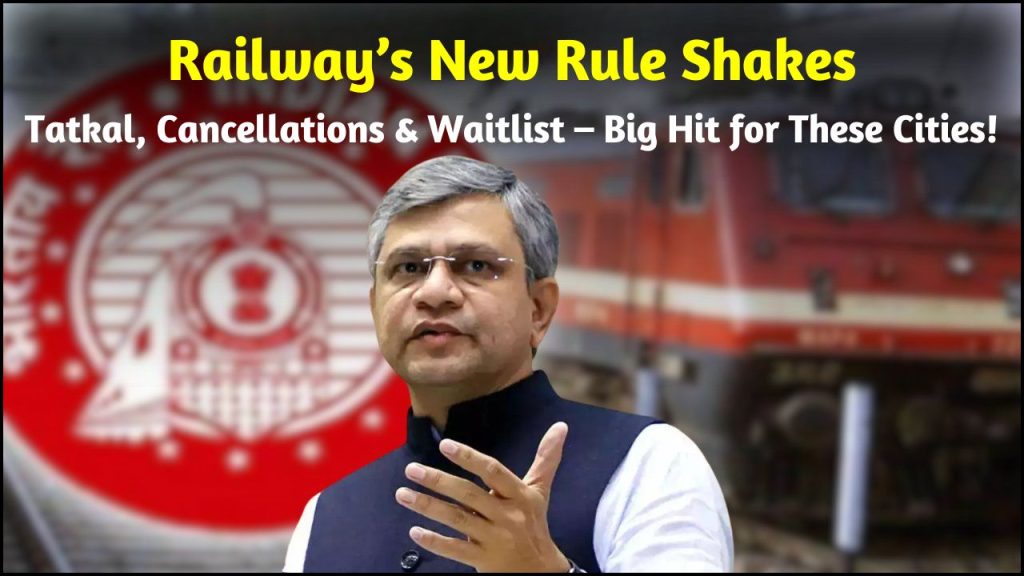
In a significant development affecting millions of train travelers, Indian Railways has introduced a new rule that alters the Tatkal ticket booking system, waitlist procedures, and cancellation policies. These changes, which took effect from April 2025, are part of a broader initiative to bring greater efficiency and transparency to the railway ticketing process. However, the move has sparked widespread debate and concern among frequent travelers, especially in high-traffic cities.
Overview of the New Rule
The newly implemented policy by Indian Railways aims to revamp the Tatkal booking system while also overhauling cancellation and waitlist regulations. This rule affects all railway zones and has introduced stricter guidelines for booking, canceling, and allocating waitlisted tickets.
Key Highlights of the New Railway Rules
Here are the major changes that have been introduced:
- Tatkal booking times have been modified for various train types.
- Cancellation under Tatkal now incurs heavier penalties.
- No refunds will be given for waitlisted Tatkal tickets booked online.
- A new algorithm has been deployed to manage ticket allocations more efficiently.
- Several major Indian cities are expected to be heavily impacted by these changes.
These revisions are part of the Railways’ broader digital strategy under the “Smart Rail 2025” initiative aimed at modernizing operations and improving the passenger experience.
Changes in Tatkal Ticket Booking
Tatkal tickets have long served as a last-minute solution for urgent travel needs. With the updated rules, several changes have been made to streamline the process and minimize misuse.
Major Updates Include:
- Revised Booking Timings: Tatkal bookings now open 15 minutes later than before for non-premium trains.
- One Ticket Limit: Only one Tatkal ticket per user ID is allowed for each train.
- No Ticket Transfers: Tatkal tickets are non-transferable under any circumstances.
- Enhanced Verification: A more robust verification process has been introduced at the time of booking.
Updated Tatkal Booking Time Table (Effective April 2025)
| Train Type | Previous Time | New Time | Applicable Classes |
|---|---|---|---|
| Non-AC Classes | 11:00 AM | 11:15 AM | Sleeper |
| AC Classes | 10:00 AM | 10:15 AM | 3AC, 2AC, 1AC |
| Premium Trains | Unchanged | Unchanged | All Classes |
| Local Trains | Not Applicable | N/A | – |
| Festival Specials | 10:00 AM | 10:30 AM | AC Classes |
| Express Trains | 11:00 AM | 11:20 AM | Sleeper & AC |
| Rajdhani/Duronto | Unchanged | Unchanged | All Classes |
Stricter Cancellation and Refund Policies
Another area where major changes have occurred is in the cancellation and refund process. While previously, some form of refund was available for cancelled Tatkal bookings, especially for unconfirmed ones, the new rules impose much stricter limitations.
Updated Refund Policy:
| Ticket Type | Refund Eligibility | Penalty | Cancellation Window |
|---|---|---|---|
| Tatkal (Confirmed) | No refund | Full fare loss | No cancellation allowed |
| Tatkal (WL/RAC) | No refund if online | Full fare loss | Auto-cancel if unconfirmed |
| General Waitlist | Refund applicable | ₹60–₹120 | Up to 4 hours pre-departure |
| Confirmed General | Refund after deduction | ₹240 minimum | 48 to 4 hours before train |
| Premium Tatkal | No refund | Full fare loss | No cancellation allowed |
| Group Bookings | Partial refund | 25% penalty | 24 hours before departure |
| Senior Citizens | Partial refund | As per class | As per IRCTC norms |
New Algorithm for Waitlist Management
To make ticket allocation more equitable, Indian Railways has introduced a software-based system that prioritizes passengers based on multiple factors like travel history, route, and user category.
Key Features of the Algorithm:
- Frequent travelers will be prioritized over occasional users.
- Senior citizens and women travelers will receive higher precedence.
- Auto-upgradation is now limited to just 10% of available seats.
- Corporate and group bookings may experience delays in confirmation.
Waitlist Priority Table
| Passenger Type | Waitlist Priority | Likelihood of Confirmation |
|---|---|---|
| Senior Citizens | High | Very Likely |
| Solo Male Travelers | Low | Unlikely |
| Frequent IRCTC Users | Medium-High | Moderate to High |
| Women Travelers | High | Likely |
| Group Bookings | Low | Low |
| First-Time Travelers | Medium | Uncertain |
| Students/Concessionary | Medium-High | Moderate to High |
Cities Most Affected by the New Rule
The changes are expected to heavily impact cities that handle massive daily passenger volumes. These cities are often hubs for Tatkal bookings and waitlisted passengers.
Top Impacted Cities:
| City | Daily Passenger Count | Impact Level | Key Routes Affected |
|---|---|---|---|
| Delhi | 2.5 million | Very High | Delhi–Mumbai, Delhi–Patna |
| Mumbai | 3 million | High | Mumbai–Ahmedabad, Mumbai–Kolkata |
| Patna | 1.8 million | High | Patna–Delhi, Patna–Bangalore |
| Lucknow | 1.5 million | Moderate | Lucknow–Delhi, Lucknow–Varanasi |
| Chennai | 2 million | High | Chennai–Bangalore, Chennai–Delhi |
| Hyderabad | 1.7 million | Moderate | Hyderabad–Mumbai, Hyderabad–Chennai |
| Kolkata | 2.8 million | Very High | Kolkata–Delhi, Kolkata–Patna |
| Jaipur | 1.2 million | Moderate | Jaipur–Delhi, Jaipur–Ahmedabad |
Public Response and Feedback
The new policies have drawn a mixed response from the public. While Indian Railways claims these steps will help minimize ticketing fraud and ensure fair access, many passengers have expressed frustration over sudden changes, particularly the lack of refunds and tougher booking procedures.
Common Passenger Concerns:
- Inability to get refunds on even unconfirmed waitlisted Tatkal bookings.
- New booking time windows are causing confusion.
- Waitlist reshuffling appears unfair to first-time users.
- Additional financial burden due to non-refundable policies.
Why Indian Railways Introduced These Changes?
According to railway officials, the purpose behind these changes is multi-faceted:
- To combat ticket scalping and fraudulent bookings.
- Ensure fair and transparent distribution of last-minute tickets.
- Modernize the system through data-driven ticket allocation.
- Enhance overall passenger convenience under the “Smart Rail 2025” initiative.
In Summary
The latest changes to Tatkal booking, waitlist management, and cancellations represent a major shift in how Indian Railways operates its ticketing system. While the reforms aim to bring in more fairness and digital transparency, they also create new challenges for passengers, especially those who depend on last-minute travel. For now, travelers are advised to adapt quickly, stay updated on revised procedures, and plan their journeys accordingly to avoid inconvenience.



